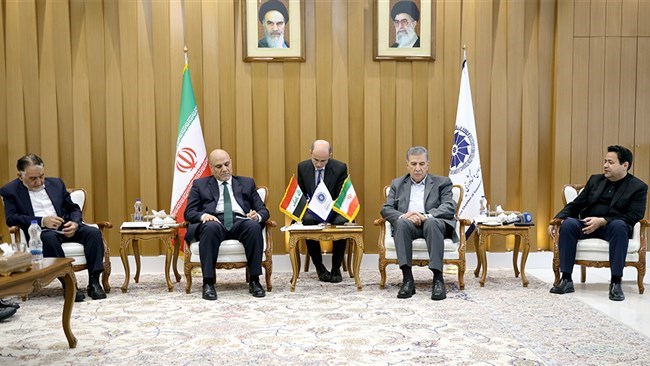Iraq Unveils $70 Billion Investment Opportunities for Iranian Companies Across Key Sectors
Hossein Pirmoazzen, Deputy Head of the Iran Chamber of Commerce, emphasized that Iraq remains one of Iran’s top economic partners, with bilateral trade currently valued at $12.7 billion. He noted Iran’s ambition to move up from being the fourth-largest exporter to Iraq to becoming the second-largest

ERBIL (Kurdistan24) — In a bold move that underscores Iraq's deepening economic ties with Iran, the Iraqi Ambassador to Tehran, Nasir Abdul-Muhsin Abdullah, has publicly called on Iranian companies to expand their investments in Iraq’s key economic sectors, according to Iran Front Page news agency.
Speaking at a joint meeting with Samad Hassan-Zadeh, President of Iran’s Chamber of Commerce, Ambassador Abdullah detailed a broad array of investment opportunities available for Iranian firms, including renewable energy, oil and gas, heavy and medium industries, agriculture, healthcare, and residential housing.
“There are 27 renewable energy opportunities across 14 provinces, two major oil and gas projects, 22 investment slots in heavy and medium industries, nine in industrial zones and free trade areas, 10 in agriculture—mostly in provinces bordering Iran—10 in healthcare, and 25 in residential housing,” he said.
Abdullah emphasized that prospects in Iraq’s free zones and industrial parks alone could surpass $70 billion. He also underlined Baghdad’s ongoing efforts to attract Iranian investors and balance trade flows between the two nations.
According to Iran's Chamber of Commerce's news website, "Iraq’s ambassador to Tehran confirmed Baghdad’s commitment to expanding trade with Iran and urged greater Iranian participation in Iraqi investment projects."
For his part, Hassan-Zadeh welcomed the invitation, urging greater transparency around investor rights and legal protections, particularly as Iran prepares to participate in an upcoming investment forum where Iraq is set to present 140 strategic projects. He also stressed the need to ease banking procedures and provide guarantees that would encourage joint production and investment ventures.
This open and high-level invitation by Iraq's top diplomat in Tehran represents a clear challenge to ongoing U.S. policy in the region, particularly Washington’s efforts to isolate Iran economically and reduce Tehran's influence in Iraq. Despite persistent calls from Washington—especially during the Trump administration—for Baghdad to reduce its economic and energy dependency on Iran, Iraq continues to deepen bilateral ties with its eastern neighbor.
Recently, U.S. officials have engaged in direct talks with Iraqi leaders, urging them to diversify energy sources and stop the import of Iranian gas, with the stated aim of achieving energy independence and curbing Iran's financial inflows that might support its regional proxy groups and missile programs. Yet Iraq has repeatedly resisted these calls.
This latest move by Ambassador Abdullah not only reflects Iraq’s defiance of Washington’s strategic roadmap for the region but also sends a strong message that Baghdad will continue to serve as an economic partner—and arguably, a lifeline—for Iran. By openly encouraging Iranian investment across critical infrastructure and economic sectors, Iraq effectively positions itself as a source of potential revenue generation for Iran, undermining U.S. sanctions and diplomatic efforts to contain Tehran.
The joint meeting in Tehran also marked the formal inauguration of the Iran-Iraq Trade Policy Council at the Iran Chamber of Commerce, Industries, Mines and Agriculture (ICCIMA). The council aims to expand bilateral trade and cut the trade imbalance between the two nations by up to 50 percent. Hassan-Zadeh said the new body would help increase the import of goods and raw materials from Iraq while promoting joint production ventures between the private sectors of both countries.
He noted that while 140 investment opportunities were recently introduced at a business forum, access to detailed data on these projects remains essential for enabling effective Iranian participation. Hassan-Zadeh also called for workshops on Iraq’s investment incentives and the simplification of banking guarantees—two major hurdles for Iranian firms.
Hossein Pirmoazzen, Deputy Head of Iran's Chamber of Commerce, emphasized that Iraq remains one of Iran’s largest economic partners, with current trade volume reaching $12.7 billion. He highlighted Iran’s goal of rising from the fourth to the second-largest exporter to Iraq and announced that 10 percent of Iran’s total imports are set to come through Basra and neighboring provinces. However, he also pointed out infrastructure bottlenecks—including delays in customs processing and the absence of modern X-ray scanning systems at border crossings—as key obstacles that have halved freight movements.
Yahya Al-e Es’haq, head of the Iran-Iraq Joint Chamber of Commerce, reinforced that banking and financial transaction mechanisms are the most urgent concerns. Without resolving these issues, he warned, long-term and large-scale investments would remain limited. He also proposed that Iraq could help balance trade by facilitating the transit of up to $5 billion worth of goods that match Iranian market demands.
Ultimately, the consistent push by Iraq to promote Iranian investment—despite U.S. pressure and sanctions—underscores a long-term strategic partnership that both sides appear committed to strengthening. In doing so, Iraq continues to assert its independent foreign policy while serving as a crucial economic corridor for Iran’s recovery and regional aspirations.
